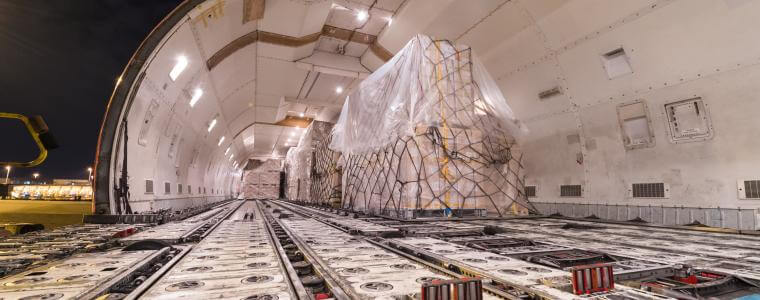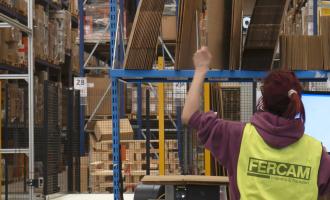
17 June 2020 - by: Eleonora Castagna
International logistics: the impact of Covid-19 on air shipments and future development projects
The air freight sector was heavily impacted by the Covid-19 emergency. Jury Michelozzi, Director of the Air & Ocean Division, describes the current scenarios, which are different for import and export, composing a picture of the initial recovery. The question of subsequent developments remains open, but the signs of recovery bode well for future projects.

According to IATA (International Air Transport Association) data, over 52 million tons of cargo (35% in terms of value of total cargo transported) are normally transported by air in any given year.
During the Covid-19 emergency period, the air transport sector suffered a particularly significant impact. In April, the decline reached historic lows, with a significant global decrease compared to the previous year. Lockdown and border closures led to an almost total paralysis of passenger traffic, thus drastically reducing the hold capacity of scheduled flights, which represents the majority of the world's cargo hold supply.
At the same time, demand has not faded, quite the contrary. The timing of air transport has been crucial in responding to emergency needs: the supply of pharmaceuticals and medical equipment essential to cope with the pandemic has been provided through dedicated transport operations, with charter flights and in extreme situations by tailoring passenger flights by placing cargo in the cabins. Customs regulations on the import of Covid-19-related medical products have been constantly updated and changed, which has led to difficulties and slowdowns during customs clearance. The imbalance between the availability of vehicles and traffic demands has rapidly led to a dramatic increase in freight costs, which have reached considerable peaks.
During the Covid-19 emergency period, the air transport sector suffered a particularly significant impact. In April, the decline reached historic lows, with a significant global decrease compared to the previous year. Lockdown and border closures led to an almost total paralysis of passenger traffic, thus drastically reducing the hold capacity of scheduled flights, which represents the majority of the world's cargo hold supply.
At the same time, demand has not faded, quite the contrary. The timing of air transport has been crucial in responding to emergency needs: the supply of pharmaceuticals and medical equipment essential to cope with the pandemic has been provided through dedicated transport operations, with charter flights and in extreme situations by tailoring passenger flights by placing cargo in the cabins. Customs regulations on the import of Covid-19-related medical products have been constantly updated and changed, which has led to difficulties and slowdowns during customs clearance. The imbalance between the availability of vehicles and traffic demands has rapidly led to a dramatic increase in freight costs, which have reached considerable peaks.
Effects of the emergency on air imports
However, for the sake of greater clarity in the analysis, the Covid-19 effect should be differentiated between imports and exports. As far as imports are concerned, as mentioned above, there have been abnormal peaks in orders for medical products, particularly personal protective equipment from Asia. FERCAM has also been an integral player in the importation of products to combat the spread of the epidemic: our team has organized specialized dedicated transportation by charter flights, importing tens of millions of masks, gowns and other items from China for Italian hospitals.
Today, after the initial emergencies, this big boom is reducing to marginal volumes, also due to the restructuring of some local enterprises, which have started to produce masks and other goods related to the prevention of contagion in Italy and Europe, as well as the partial shift of focus towards maritime transport for this sort of product.
Excluding the needs linked to Covid-19, a recovery can be seen, but it is still very slow. Production activities in Asia have started up again ahead of the European continent but have not yet reached full productivity. The data (in any case, always partial) coming from the area, indicate a recovery of 70-75% of the total population. However, if we also include the area of the Indian subcontinent, this percentage is further reduced.
The reopening of production, particularly in China, no doubt resulted in an increase in export volumes as early as May, but even though the number of orders in Europe is more satisfactory, it has not been possible to re-establish regular export levels. Generally speaking, the demand for raw materials shows interesting signs of growth, but the same cannot be said for finished products.
Export: which markets are returning to standard volume?
In terms of exportation, the recovery in recent weeks has still only been hinted at, as some parts of the world are still locked down and even in countries undergoing reopening, the number of orders is below standard. In Latin America, the pandemic is not in a declining phase yet, so export volumes to these destinations are still at their lowest levels. Similarly, the slowdown in traffic, dedicated in particular to the textile and fashion sectors, into the Middle East and Asia persists. <
On the other hand, the USA, the primary market for Europe, is actually starting up again (albeit slowly), giving us positive signals for the exportation of some commodities with a progressive increase in demand. Certainly, there are sectors that have not suffered particularly negative impacts, such as food and pharmaceuticals, where demand, for obvious reasons, remains constant. In many cases, however, what we are shipping today is related to pre-closure orders, which for many producers and entrepreneurs has resulted in the fear that the crisis period may continue for some time. As far as the export of machinery is concerned, the effects will be even more delayed, due to the slower lead times, which are typical of the manufacturing industry.
Positive signals and future investments
All in all, the situation is gradually returning to normal in many respects. Despite the fact that the consequences of the pandemic will continue to affect international trade in the coming months, we are already seeing signs of recovery, with positive signs coming from our branches in Italy and Europe. Confidence in the industrial infrastructure of our country leads us to be hopeful, especially when combined with the resilience and inventiveness typical of Italian entrepreneurship.
We trust in the coming months that we will have better insight into the trends regarding orders and changes in production methods. It is expected that the habits of the final consumer will also change, that impulsive and unnecessary purchases will be substantially reduced, at least for a certain period. We will therefore have to remain ready, in order to be able to react quickly and carefully, making long-term business investments, which will help us to strengthen our presence on the market.
FERCAM, thanks to our widespread network in the region and our specialist expertise, will certainly be there to support our customers in this phase, continuing to offer services with excellent added value and comprehensive logistics consultancy.
Share


 Language
Language

























